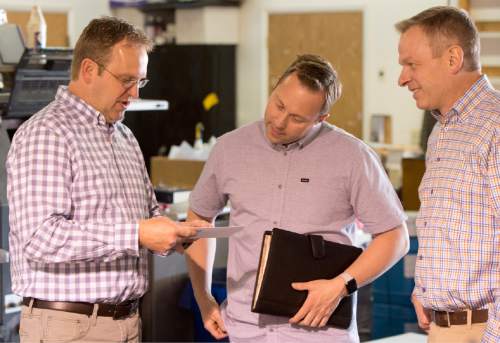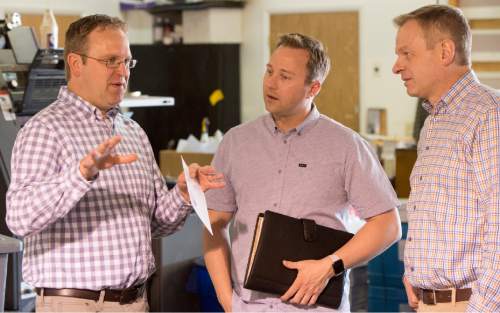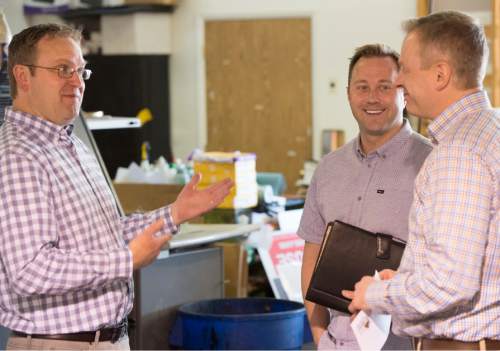This is an archived article that was published on sltrib.com in 2016, and information in the article may be outdated. It is provided only for personal research purposes and may not be reprinted.
In an era of increasing partisanship, Taylor Morgan is an unusual political operative. He's an active Utah Republican trying to help a Democrat win a U.S. House seat.
While his boss, Doug Owens, was shaking hands with voters waiting in long lines at the recent Democratic caucuses, Morgan served as the chairman of his Republican precinct meeting in Draper. In the presidential caucus, he supported Ohio Gov. John Kasich, though most of his neighbors preferred Texas Sen. Ted Cruz.
In the governor's race, Morgan is a fan of Utah Republican Gov. Gary Herbert, and he has some nice things to say about Rep. Jason Chaffetz, R-Utah, who is his federal representative.
And yet, Morgan, who serves as Owens' chief strategist, believes Utahns should send GOP Rep. Mia Love packing.
"I've always believed firmly that good candidates are more important than a party label," he said. "Doug really fits that bill for me. ... I'm definitely not the only Republican who supports Doug."
If Owens has any chance to beat Love in their second showdown in the 4th Congressional District, he'll need to get a big chunk of Republicans to view him the way Morgan does. In 2014, about 17 percent of Republicans voted for Owens, though he still lost by roughly 5 percentage points.
Owens is the son of the late Rep. Wayne Owens, D-Utah, and he's modeling his campaign on that of former Rep. Jim Matheson, D-Utah, who held the seat before Love. He's even using Matheson's slogan of "Utah first."
"I'm putting Utah first and getting beyond party labels," Owens said. "I'm going to be a strong, independent voice for Utah."
Owens knew of Morgan's partisan leanings and party positions before he hired him in May 2014. He didn't care. He said that writing off people because of their party labels is the "core of the problem in Washington," adding that he wouldn't be driven by party politics. He recently refused to say whether he would vote for the eventual Democratic presidential nominee.
Still, he chose to run as a Democrat, selecting a party label. He suggested that move was partly to honor his father and partly political reality.
"It's a two-party system," Owens said.
In Utah, however, one party is dominant. The Republicans require a voter to register as a party member before voting in primaries, have aggressively defended the convention systems and, in Utah County, even implemented a loyalty pledge.
It's not surprising that some party insiders wouldn't take too kindly to seeing Morgan running a Democrat's campaign.
"It is just fishy," said Michelle Mumford, a GOP activist living in Salt Lake City. "If you are a Republican Party leader, you shouldn't be running a Democrat's campaign, and I think anyone on the street would tell you that."
Morgan should have worked to find another Republican to challenge a candidate he didn't support, she said, rather than help the state's minority party.
At the least, Mumford said, if Morgan was going to work as Owens' strategist, he should have given up his GOP precinct chairmanship.
"You are going to be completely impotent in helping Republicans in your district," she said, "if you are helping Democrats in another district."
Morgan said there's no conflict because he lives in the 3rd Congressional District represented by Chaffetz, while Owens is campaigning in the 4th. He also didn't run again to be a delegate or precinct chairman during the recent caucuses.
Morgan's moderation and political flexibility run in the family.
Baird Morgan, his father, is a conservative Republican. His mother, Karen Morgan, is a moderate Democrat who served 10 years in the Utah House and four years in the state Senate. Taylor Morgan, like her other four sons, would help out on her campaigns until she retired in 2013. And the family often discussed and debated politics.
"When we sit around the table and talk politics, we all have a lot of very similar viewpoints, but choose to affiliate with different parties," Karen Morgan said. "All of my boys are very independent thinkers."
Taylor Morgan said he's a Republican because he believes in "free markets, personal responsibility and limited government."
"I believe people are the source of solutions," he said, "and not governments."
And yet his first job out of college was working with Democrats on the House Foreign Affairs Committee in Washington in 2007. When it started to get a little too partisan for his taste, Morgan moved back to Utah to work for the Hinckley Institute of Politics at the University of Utah, and from there got a job as an election specialist for the lieutenant governor's office.
He ran to be a state Republican delegate in 2012 to support Herbert's re-election effort. That year, he also gave a small donation to Matheson, the Democrat, and Love, the Republican, who were rivals in the 4th District.
Morgan left state employment to serve as the executive director of Count My Vote, a bipartisan group that pushed for direct primaries over the convention system and eventually compromised with the state Legislature on a dual-track system. Candidates can now reach a primary ballot through the convention or by collecting signatures.
It was during his Count My Vote stint that Morgan met Owens. The organization's offices were in the Crandall Building in downtown Salt Lake City, where Stephen Owens, Doug's brother, worked as a lawyer. Stephen Owens knew Morgan through the Hinckley Institute and helped out on the Count My Vote campaign. During conversations the two had, Owens urged Morgan to meet with Doug Owens about the congressional campaign in spring 2014.
While Morgan liked Doug Owens, he didn't see him as having a legitimate shot, not in a Republican-leaning district against Love, who was well known and well financed. He turned down Owens' job offer. But the rejection didn't stick.
Seeing Owens as a father and getting to know him better over the next several weeks, Morgan's original view — based on the cold, hard politics of the race — softened.
"I couldn't have lived with myself," Morgan said, "if I had an opportunity to work with someone as good as Doug Owens and I turned that down because of politics."







